Simchat Bat - BabyNaming / 25.3.2017 / 27. Adar 5777
On this day we and many family members gathered to celebrate a touching and exciting event: Simchat Bat! welcome of a girl to the community.

The family had come from near and far to celebrate this feast together. Probably the parents were more excited than all together - in contrast to their daughter, who didn't mind so much and who enjoyed the attention, comfort and satisfaction, curiosity and wakefulness.
It was a touching p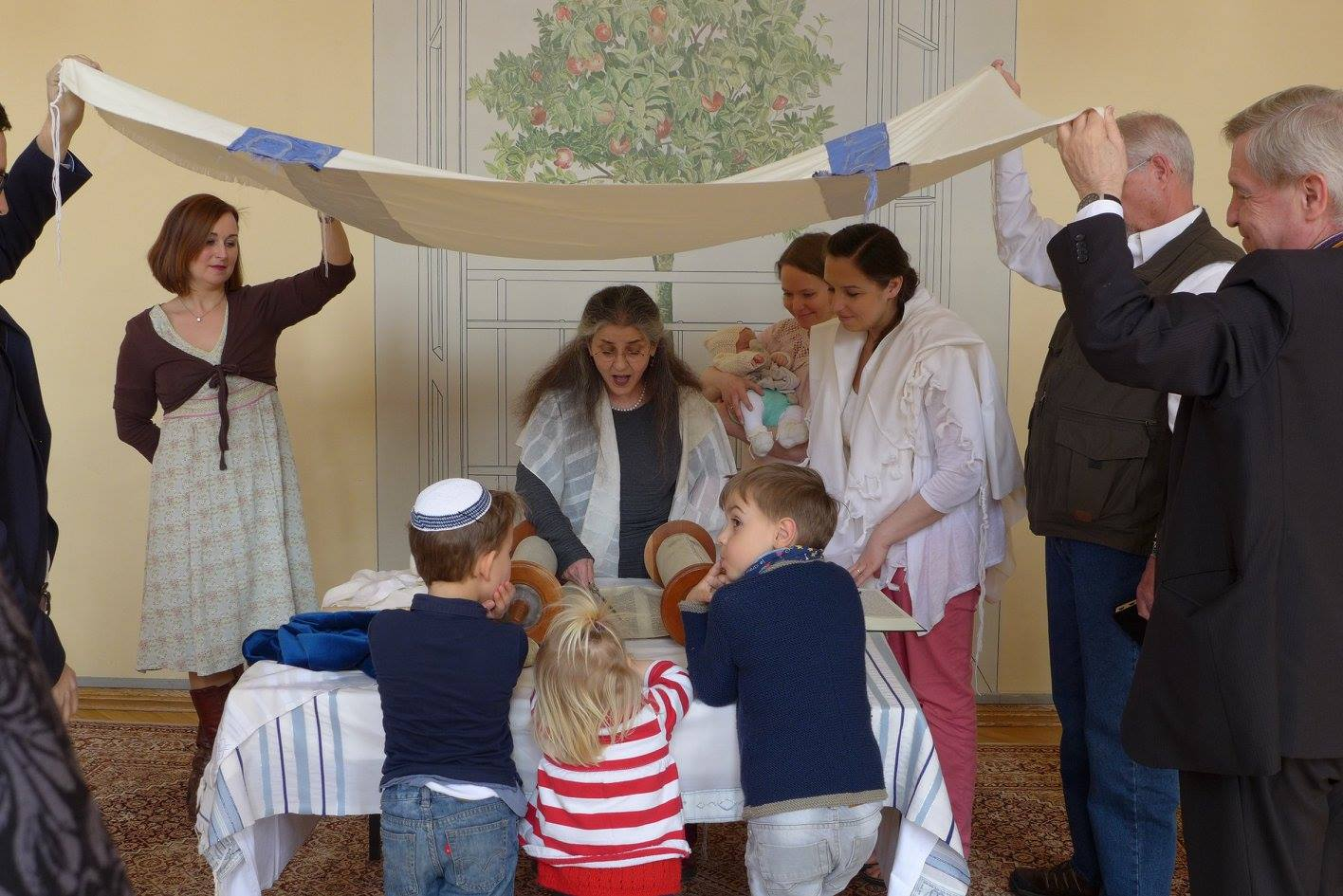 icture, a moment of intense encounter, to feel this new life and to welcome it into this world, into our community. The presence of God is reflected in the presence of the people and we all felt this, the chuppa stretched over the newborn child, the Torah offered her protection and home, her place, Makom. The best wishes of all shall accompany her Ad mea w'essrim, until 120 years.
icture, a moment of intense encounter, to feel this new life and to welcome it into this world, into our community. The presence of God is reflected in the presence of the people and we all felt this, the chuppa stretched over the newborn child, the Torah offered her protection and home, her place, Makom. The best wishes of all shall accompany her Ad mea w'essrim, until 120 years.
During the following Kiddush there was laughter and enjoyment, stories were told. Little Neta Rose asked Bina w'Leah to bring us all together.
Text: Esther Trapp - Photos: Anna Adam
Purim 5777 / 11.3.2017 / 13. Adar 5777
It was almost dark when a small community gathered in a galaxy between two spiral arms at position 30°MZPerX12'5 in a solar system with 8 planets on the 3rd of these planets to remember an event from long ago: Purim!
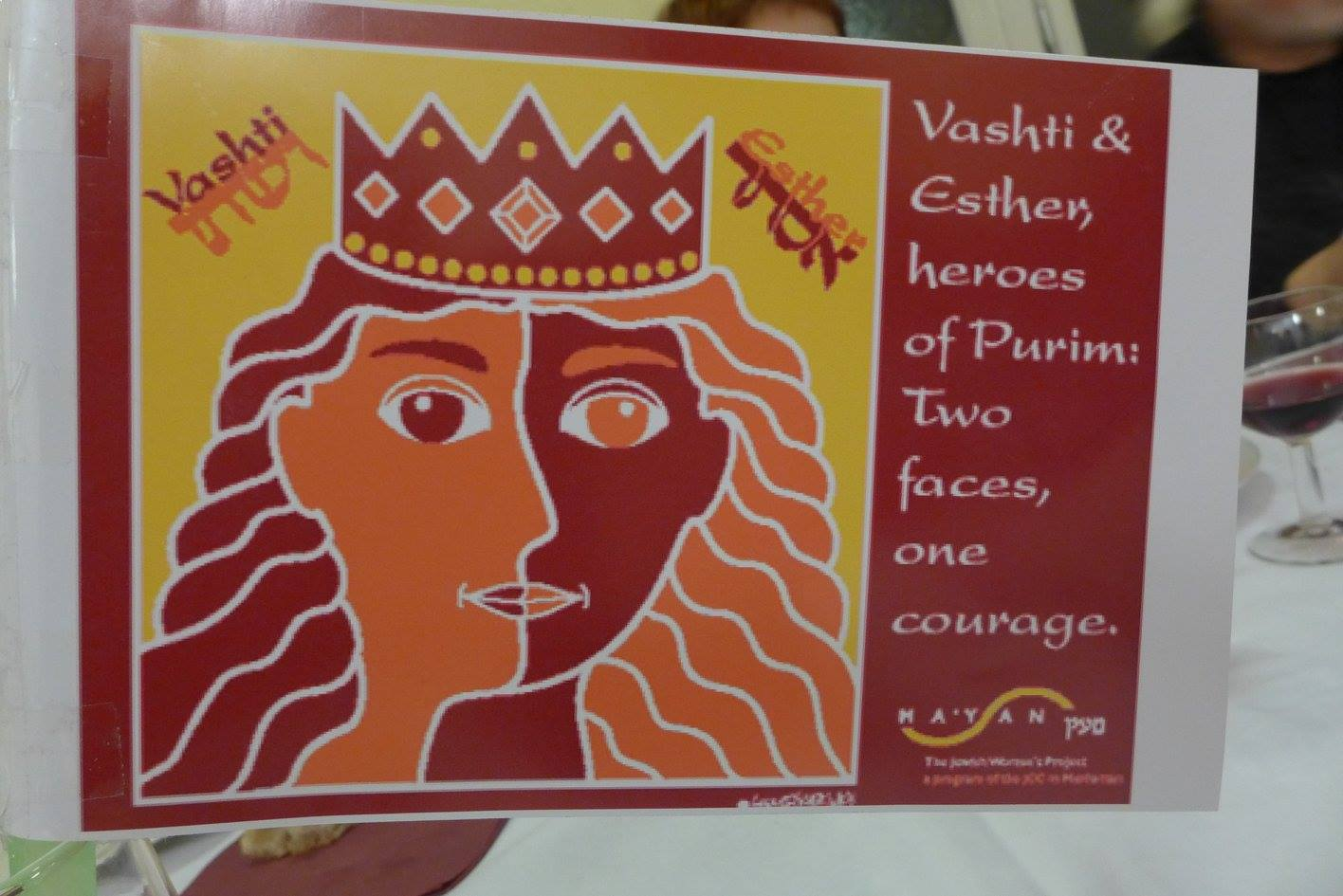 Unfortunately this time, for various reasons, some lovely faces were missing - especially Etha was missed very much!
Unfortunately this time, for various reasons, some lovely faces were missing - especially Etha was missed very much!
First the traditional and delicious hamantaschen were baked: Sweet, jammy, tasty but also hearty - Anna had prepared dough and ingredients very well and soon the bakers had understood how to make the well-known form.
Jalda led through the evening prayer and the reading of the Megilla, led us through songs and texts. Jona Kirchner's d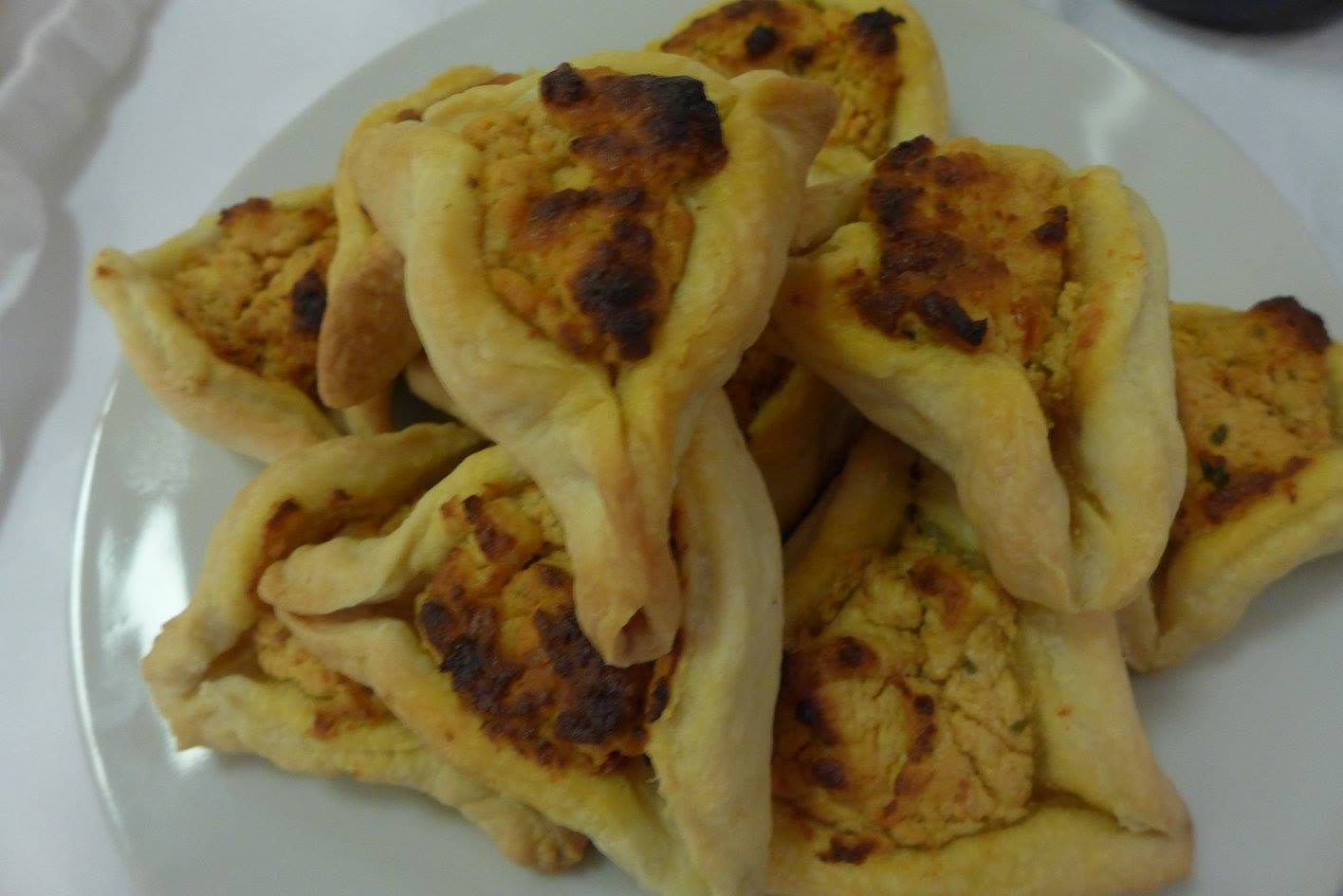 elicious science fiction tour through the megillah was read in turn and everyone enthusiastically shook their various noisemakers - Haman was booed hard.
elicious science fiction tour through the megillah was read in turn and everyone enthusiastically shook their various noisemakers - Haman was booed hard.
We discussed a little bit about the meaning of this story, the role of Esther, but also Mordechai and Haman - with all recognition and admiration the figure of Esther in the megillah challenges us to discuss a modern image of women.
We let the celebration end in the traditional Ohel style with a hearty and healthy, vegetarian potluck and good conversations as well as plenty of laughter around o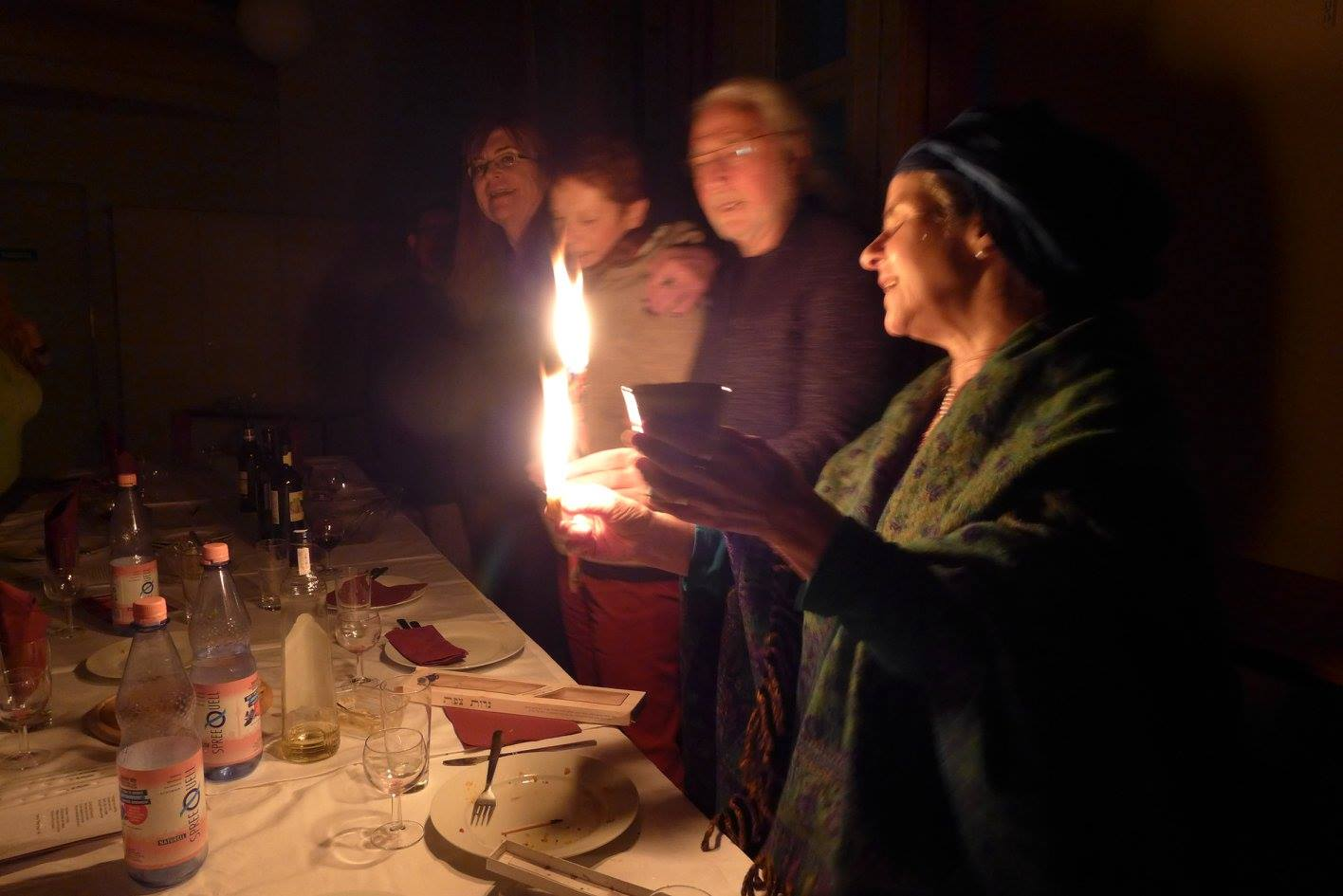 ur big table, yes, even the alcohol was quite good there...
ur big table, yes, even the alcohol was quite good there...
The concluding Hawdala ended the evening, led into the new week and everyone left happy and elated.
Text: Esther Trapp
Photos: Anna Adam
Tu biSchwat 5777 / 12.2.2017 / 16. Shvat 5777
On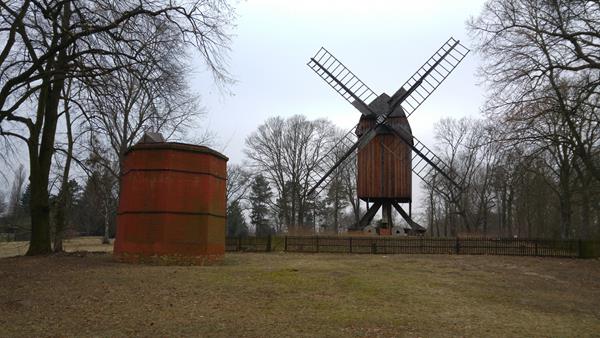 Shabbat, February 12, 2017, we celebrated Tu biSchwat, the New Year's Feast of Trees, in the late afternoon in the remise of Gatow Manor. On this day the average temperature in Jerusalem was 13°C, and we were freezing cold. Since it is impossible to plant trees in February in these weather conditions in our latitudes, we at Ohel Hachidush have for some years now been thinking up a special ritual: we meet in the estate's well-heated coach house, enjoy Rita's delicious vegetable soup and homemade cakes, as well as the food we brought with us, this time with an emphasis on the fruits of the land. Afterwards our children plant pumpkin and other suitable seeds in flower pots. In the spring, the seedlings are then replanted in our Green Shul or Rita's Garden of World Religions to be harvested into Sukkot. A particularly beautiful Hokkaido pumpkin is then processed over an open fire into a delicious vegetable soup, which we enjoy together. It is wonderful when city children experience the rhythm of Mother Earth and the Jewish calendar.
Shabbat, February 12, 2017, we celebrated Tu biSchwat, the New Year's Feast of Trees, in the late afternoon in the remise of Gatow Manor. On this day the average temperature in Jerusalem was 13°C, and we were freezing cold. Since it is impossible to plant trees in February in these weather conditions in our latitudes, we at Ohel Hachidush have for some years now been thinking up a special ritual: we meet in the estate's well-heated coach house, enjoy Rita's delicious vegetable soup and homemade cakes, as well as the food we brought with us, this time with an emphasis on the fruits of the land. Afterwards our children plant pumpkin and other suitable seeds in flower pots. In the spring, the seedlings are then replanted in our Green Shul or Rita's Garden of World Religions to be harvested into Sukkot. A particularly beautiful Hokkaido pumpkin is then processed over an open fire into a delicious vegetable soup, which we enjoy together. It is wonderful when city children experience the rhythm of Mother Earth and the Jewish calendar.
This year Rita has come up with a very special surprise: She has picked up the seeds of a Hokkaido pumpkin from last year and dried them. These are exactly the seeds the children planted at our celebration this year. It was touching to watch with what devotion and care the little children put the tiny seeds into the soil of the flower pot and gave them a bracha, a blessing. This small celebration also brought back to us adults the infinity of the cycle of nature. At Sukkot 5778 a new cycle begins again.
As a special highlight Rita thought up a little present for all present: She packed the remaining pumpkin seeds from the past Sukkot in pretty little bags. Everybody should choose one and take it home with them. Now the pumpkins will also grow on our balconies and in our gardens in springtime, 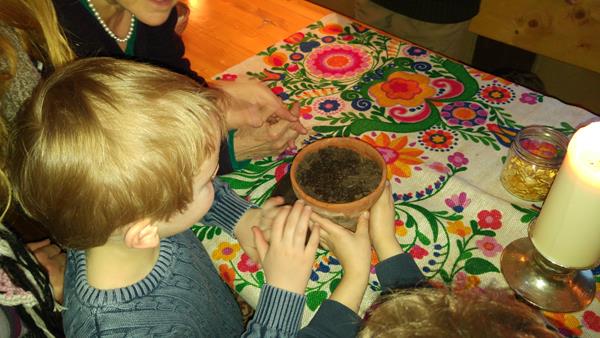 reminding us of Sukkot and Tu biSchwat and strengthening the bond with our millennia-old religion and nature. A small contribution to Tikkun Olam
reminding us of Sukkot and Tu biSchwat and strengthening the bond with our millennia-old religion and nature. A small contribution to Tikkun Olam
At the end of our celebration we all visited the birch tree in the garden behind the remise. In some years, when it is very quiet outside, you can hear the sap rising in the trunk of the tree before the beginning of spring, giving it new vitality. This year, unfortunately, we haven't he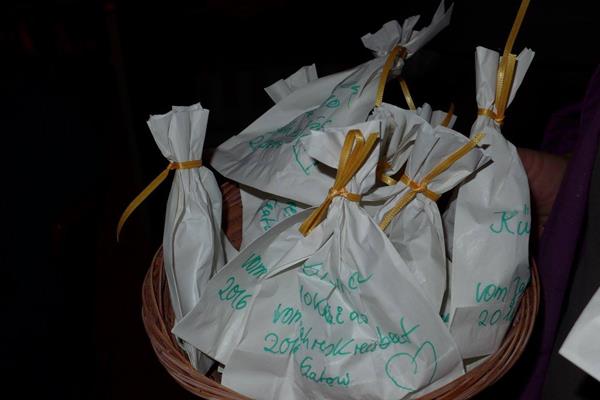 ard anything yet, but the ground was still very frozen. We have to be patient a little longer. But the children had better ears. They could hear the sap of the birch tree rising.
ard anything yet, but the ground was still very frozen. We have to be patient a little longer. But the children had better ears. They could hear the sap of the birch tree rising.
At the very end, when it was dark for a long time, a fox came walking by. Fearing for the chickens of the manor, the children quickly chased him away.
As always, we thank Rita and Ulli from the bottom of our hearts for their hospitality and the commitment with which they enrich our celebrations and participate in them.
Text: Etha Jimenez
*** Translated with www.DeepL.com/Translator (free version) ***
am Shabbat, den 12. Februar 2017 feierten wir am späten Nachmittag in der Remise des Gutshofs Gatow den Tu biSchwat, das Neujahrsfest der Bäume. In Jerusalem herrschte an diesem Tag eine Durchschnittstemperatur von 13 °C, bei uns klirrende Kälte. Da man bei diesen Wetterbedingungen in unseren Breitengraden im Februar keine Bäume pflanzen kann, haben wir uns bei Ohel Hachidusch seit einigen Jahren ein besonderes Ritual ausgedacht: wir treffen uns in der gut geheizten Remise des Gutshofs, genießen Ritas leckere Gemüsesuppe und hausgemachten Kuchen sowie unsere mitgebrachten Speisen, dieses Mal mit Betonung auf den Früchten des Landes. Danach pflanzen unsere Kinder Kürbis-und andere geeignete Samen in Blumentöpfe. Im Frühling werden die Setzlinge dann in unsere Green Shul bzw. in Ritas Garten der Weltreligionen umgepflanzt, um dann Sukkot geerntet zu werden. Ein besonders schöner Hokkaido Kürbis wird dann über offenem Feuer zu einer leckeren Gemüsesuppe verarbeitet, die wir gemeinsam genießen. Es ist wunderbar, wenn Stadtkinder, so den Rhythmus von Mutter Erde und dem jüdischen Kalenders erfahren.
Dieses Jahr hat sich Rita noch eine ganz besondere Überraschung ausgedacht: Sie hat die Kerne eines Hokkaido Kürbisses vom letzten Jahr aufgehoben und getrocknet. Genau diese Kerne haben die Kinder auf unserer diesjährigen Feier eingepflanzt. Es war rührend zu beobachten, mit welcher Andacht und Vorsicht die kleinen Kinder die winzigen Samen in die Erde des Blumentopfes legten und ihnen eine Bracha, einen Segensspruch gaben. Auch uns Erwachsenen hat diese kleine Feier die Unendlichkeit des Kreislaufs der Natur wieder vor Augen geführt. Zu Sukkot 5778 beginnt dann wieder ein neuer Zyklus.
 Als besonderes Highlight hat sich Rita noch ein kleines Geschenk für alle Anwesenden ausgedacht: Sie packte die übrigen Kürbissamen vom vergangenen Sukkot in hübsche kleine Tüten. Jede(r) dürfte sich eine aussuchen und mit nach Hause nehmen. Nun werden die Kürbisse im Frühling auch auf unseren Balkons und in unseren Gärten wachsen und uns an Sukkot und Tu biSchwat erinnern und die Verbundenheit mit unserer jahrtausendealten Religion und der Natur stärken. Ein kleiner Beitrag zu Tikkun Olam.
Als besonderes Highlight hat sich Rita noch ein kleines Geschenk für alle Anwesenden ausgedacht: Sie packte die übrigen Kürbissamen vom vergangenen Sukkot in hübsche kleine Tüten. Jede(r) dürfte sich eine aussuchen und mit nach Hause nehmen. Nun werden die Kürbisse im Frühling auch auf unseren Balkons und in unseren Gärten wachsen und uns an Sukkot und Tu biSchwat erinnern und die Verbundenheit mit unserer jahrtausendealten Religion und der Natur stärken. Ein kleiner Beitrag zu Tikkun Olam.
Zum Abschluss unserer Feier besuchten wir alle noch die Birke im Garten hinter der Remise. In manchen Jahren, wenn es draußen sehr still ist, hört man schon vor Beginn des Frühlings, wie die Säfte im Stamm des Baumes aufsteigen und ihm neue Lebenskraft geben. Dieses Jahr haben wir leider noch nichts gehört, der Boden war jedoch auch noch sehr tief gefroren. Da müssen wir uns noch ein wenig gedulden. Aber die Kinder hatten bessere Ohren. Sie hörten wie der Saft der Birke aufsteigt.
Ganz am Schluss als es schon lange dunkel war kam auch noch wie selbstverständlich ein Fuchs vorbeispaziert. Aus Angst um die Hühner des Gutshofes haben die Kinder ihn schnell verscheucht.
Wie immer danken wir Rita und Ulli von ganzem Herzen für ihre Gastfreundschaft und das Engagement, mit dem sie unsere Feste bereichern und an ihnen teilhaben.
Text: Etha Jimenez
Chanukka 5777 / 30.12.2016 / 1. Tevet 5777
Far away from the hustle and bustle of Berlin, our Ohelistas gathered their friends and families in the Remise in Gatow. The big iron stove churned out a calming warmth and light, shrouding the whole room in twilight and coziness despite the wintery weather outside.
One after another, they all arrived: Big and small, the children with their handmade Chanukkiot, the adults with their own, handed down to them by the trusty hands of tradition from their mother, father or other relatives.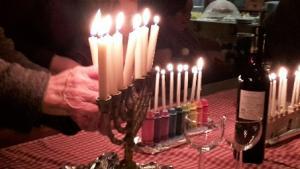
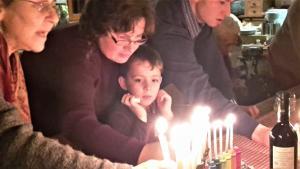
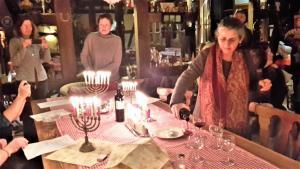
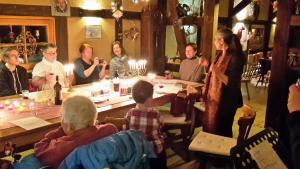
It was wonderful to see that the ‘temple band’ prepared songs and handed out lyric sheets so all could sing along. As Jalda began the celebration, the room was packed with faces full of expectation – and ever more arrived.
The question was: Which candles to light first? Since it was also the beginning of Shabbat, nobody was quite sure of the answer… But soon came the solution: Of course you would have to light the Channukka lights before lighting the Shabbat candles, as you aren’t allowed to work – or light candles – on Shabbat. And as soon as this issue was sorted out, the children in particular couldn’t be stopped anymore – They wanted to see their beautiful Chanukkiot shine!
But wait! From what side do you start lighting the candles? Left to right? The other way around? The newest candle first? What’s with the ninth candle? Which Brachot are there to say? This time, Jalda didn’t leave us in the dark for too long and explained to us the purpose of the ‘Shamash’. Soon all was clear as day: left to right, ‘newest’ candle first.
And then we told the story of Chanukka. We told of our battle against the occupying forces, their decree forbidding the Jewish way of life and our rites of celebration, our commemoration days and our access to the temple. We told of our ruses to continue teaching in the Jeshiwa. We told of the Dreidel game as a deception during inspections. We heard of the strong women fighting for the resistance from the underground in acts of guerrilla warfare. Every war is ugly and gruesome, but at least in this case, it was inevitable. We heard of the role of women fighting side by side and on eye level with the men.
And of course, we told of the most important part; of success and victory, of ejection and the retreat of the enemy; of the restoration of the temple that was almost a complete reconstruction, so severe was its defilement. And then of the seeming impossibility of the temple’s candles burning long enough until new blessed oil could be produced – 8 long days, although the pitiful remaining rest was barely enough to light them for a single day.
We also discussed the apparent connection between Christmas and Chanukka, the superficial similarities, but also the grave differences and the impossibility of comparing the two.
All had gathered around the many burning Channukka candelabras and listened spellbound. It is a festival of lights, of joy even, but as so many of our holidays also one that was created by desperation and persecution. Between all the beauty and joy, there is also a more serious, contemplative note to it.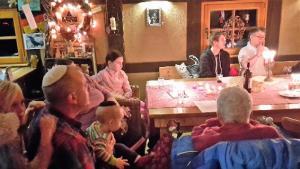
For every Jewish holiday, there has to be a tasty and expansive feast – again crowned by Rita’s delicious soup and the many different dishes that were brought. Not to forget the conversations between one another, as the opportunities to meet everyone are way too few and far between.
The temple band ensured good vibes and offered many songs to sing along to, ending a wonderfully bright and shiny evening. L’Chaim! 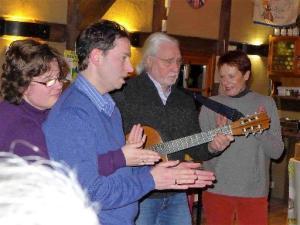
Text: Esther Trapp Translation: Joseph Rebling
Photos: Anna Adam and Esther Trapp
Sukkot 2016 / Tischrei 5777
As at many beautiful Sukkot festivities previously, Anna built the framework of the Sukkah from old disused wooden pallets and battens with expert hand and skillful helpers in Rita's garden. The Ohelistas came one after the other. At the approach they were enchanted by the wonderful smell of the wood fire in Rita's and Uli's court of the Gatower remise. Cantor Jalda, the children, and all the folks of Ohel Hachidusch went to the field to harvest it enthusiastically, so that it might beautify the sukkah and our harvest festival. Many beautiful pumpkins, quinces, but also shrubbery of pumpkin for the roof of our sukkah could still be found in the field. Likewise carrots, onions, chard and fennel, as well as sage. And right, Anna, her helpers, and the children built and decorated the most beautiful sukkah Ohel Hachidusch ever had.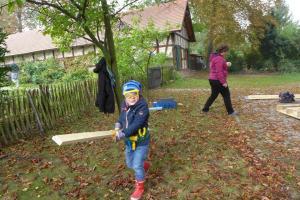
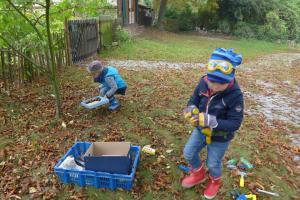
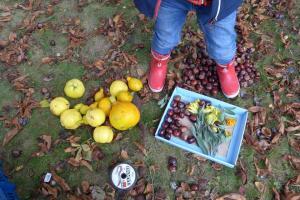
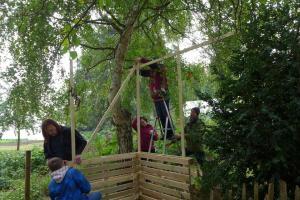
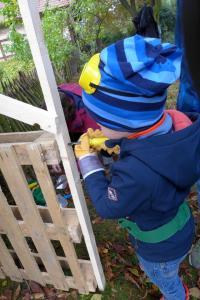
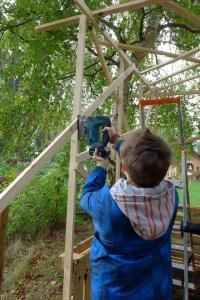
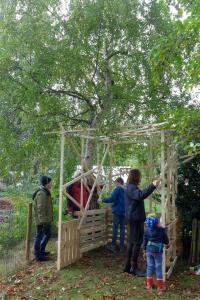
And certainly the only one in Berlin which had a pomegranate tree with fruit at the entrance.
This one, lovingly nursed by Rita Reinicke in the Botanicum, was lent to us especially for our Sukkah. The fruit is mentioned several times in the Torah. The pomegranate has 248 nuclei, as many as there are positive mitzot. With its many precious stone fruit cores, it is primarily a symbol of unity in diversity, of abundance and creative creativity, of renewal and fertility.
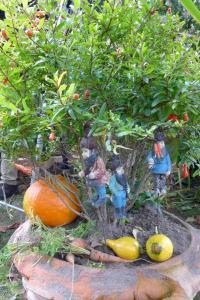
But before celebrating kiddush in our sukkah and the subsequent meal in Rita and Uli Reinicke´s autumnally decorated carriage house, let me add a small excursion:
No Jewish holiday is more popular among American and Israeli environmentalists than Sukkot. With its agricultural roots and its commandment to be connected to nature in provisional huts for a week, Sukkot is the sine qua non of Jewish environmental protection. What is more beautiful than what was cultivated by ourselves, eaten and drunk in a sukkah, and under seasonally appropriate fruits hanging from the roof rafters?
Every year we produce a massive Co2 footprint when we make a feast of overflow at Sukkot instead of realizing its message of living more sustainably and more in accordance with the seasons. From an environmental point of view, also etrog and lulav, the branches of the palm tree, myrtle, brookweed, the complete festive bouquet - are problematical. They are flown in from Israel and sent massively to Jewish communities, which cannot grow palm trees or etrog groves because of the winter season. The mitzvah of the arba mimin, the commandment of the use and shaking of the four species required for Sukkot, was regulated at a time and in a place where these four species were abundant, regional and renewable. When Maimonides wrote Hilchot Sukkah, in which he explained the commandment of etrog and lulav, he lived in Egypt, where etrog, palm tree, bovine pastures, and myrtle leaves were to be found as easily a good cup of coffee in Rome nowadays.
Surrounded by children, cantor Jalda stands inside the beautiful sukkah and asks the children, "Can you see the sky through the roof?" And when they say yes, Jalda declares the sukkah as kosher and says kiddush with her beautiful voice.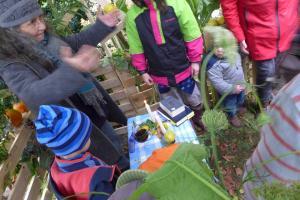

And so cantor Jalda reminded us at dinner of the tradition known to all Jews, according to which Rabbi Jochanaan said: The lulav is turned in the honor of G-d, for G-d belongs to the four heavenly directions; It is held up and down for the glory of G-d, for G-d is heaven and earth.
Just as the citrus fruit has a taste as well as a sweet smell, there are people in Israel who are both learned and live their faith.
As the fruits of the palm branch have taste but are odorless, there are in Israel people who are learned, but do not live their faith.
As the branches of myrtle have a pleasant smell, but are inedible, there are people who do good works, but are not learned.
As the branches of the brookweed are neither edible nor do they have a pleasant smell, there are people who are neither learned nor do they do good works.
But all belong together.
For, as it is said, G-d, baruch hashem,says: "Let Israel not perish, let them all be bound together, as plants are bound together, into a covenant, so that the righteous among them will effect the atonement of the others. And referring to us, cantor Jalda reminded us, that we too are often one or the other, and only together we are a blessing.
And so we used the quince of Jalda's tree on our field instead of the etrog.
For the palm branch there was a branch of a palm tree in the pot.
There was the local brookweed from Rita's garden and the myrtle from a flower pot. All these ingredients for the lulav we have picked from our field and the Botanicum.
As Anna wrote me, the idea of replacing imported plants with local ones originally came from Rabbi Jan Salzman from Vermont / USA, now Rabbi in Burlington / USA.
One more excursion to the rabbis: They say that everything that exists on earth has its spiritual counterpart in heaven. When you think about Sukkot, you wonder if G-d would have a Sukkah in a spiritual sense. And if so, what would He use for the s'chachon, for the roof above the structure? We used the cut stalks and leaves of the pumpkin plants of our field. The remains of our harvest.
During Rosh Hashanah, the days of repentance, and at Yom Kippur, we confess our mistakes and blindness before G-d.. We aim to remedy these mistakes and renew ourselves. The rabbis say that in the effort in which we transform ourselves into better human beings, abandoning the errors and doing Teshuvah, every recognized sin becomes a stepping stone for the good. Every transgression is lifted from the low place of its emergence into a position of honor, and brings us closer to G-d. Perhaps the husks and blends from which the s'chachon, the roof of G-d's Sukkah is built, are the mistakes we have made? The uglier and the lower the fault was which was expiated at Yom Kippur, the more simcha (joy) it brings to G-d's Sukkah.
That´s the way it is: When we sing and eat and drink in the shadow of the abandoned shoots of the plants of our garden and field, amidst the fruits of the field, G-d is perhaps sitting under the clippings of his vineyard and shouting a joyous le-chayim toward us. And when He does that, delighted with His harvest, He looks through the cuts of the past year and now discovers in them the blessings. And so we eat and drink gratefully in the warm, comfortable retreat in Gatow, which Rita and Uli so nicely prepared for us, devoting ourselves to Anna´s and the Ohelistas expert sukkah building arts and Jalda's beautiful voice and blessed words. We eat Rita's tasty pumpkin soup, which was boiled on a fragrant wood fire in the yard, and enjoy Rita's delicious cheesecake as well as our other home-made food and challah. Chag Sameach!
Text: Romy Koecher Photos: Anna Adam
Translation: Etha Jimenez and Joseph Rebling
Reb Goldie Milgram bei Ohel Hachidusch / 8. 10.2016
Rabbi Dr. Goldie Milgram was our special guest at Shabbat Shuva / 6th of Tishri 5777.
It began with a welcome in the Remise by Hazan Jalda Rebling. Then Reb Goldie lead us through a wonderful meditation in the Botanicum, a paradisaical place a few meters farther, with its endless abundance of just-flowering plants in their last days of flowering. Once more, the autumnal golden-growing leaves of the lush extensive trees lit Reb Goldie Milgram´s ´minchah meditation in a very special light for us. Rita Reinicke had planted a botanical garden in the large garden of the estate, divided into four areas: Judaism, Christianity, Islam and Buddhism. The plants therein are those, which are mentioned in the texts of the respective religion. In the Jewish part of the garden you can find sage, pomegranates, olives and wine. In the Buddhist area there is a ginkgo tree, in the Christian part there is a monastery garden with medicinal herbs mentioned by Hildegard von Bingen, and in the Islamic part we grow mint and beautiful Damask roses.
Rabbi Dr. Goldie Milgram from Philadelphia (USA) has written numerous books on contemporary Jewish topics. She is no unknown to us. She visited us 5 years ago in the Remise of the Gatow grange, so we were very happy to welcome her back to us and learn from her. Rabbi Milgram was ordained by the Reconstructionist Rabbinical College. She founded and led the Reclaiming Judaism Press and www.ReclaimingJudaism.org, an organization which, among other things, developed new strategies to keep Jewish rituals and mitzvot alive and to renew them. www.facebook.com
www.facebook.com
In addition to her books, Rabbi Milgram produced interesting materials on this subject, such as her Mizvot cards, from which she presented to us a rich selection. Again it was an exciting and intensive learning experience for us and we were very grateful to benefit from the Mizvah of time for learning and teaching, which Reb Goldie dedicated to us. Our discussion with Reb Goldie was about the mitzvah of giving, but also about the opposite, the inability to give, as she vividly explained in the final story of Ashley.
Reb Goldie told us:
Ashley lived with her beloved, Randy, near a beach with baby-powder-fine sand and
serene cerulean gulf waters.
Now Ashley was not always a considerate person when it came to little things. Little
things like pointing out to her elderly father that he had lost something when that didn’t
really need to be mentioned, or leaving her dishes in the sink for Randy to wash. Rather
than making the effort of doing so, Ashley never recycled anything and she always
blamed others for her own mistakes.
While she certainly knew better, still Ashley never regretted these things. She never
apologized or did teshuvah. Every Friday, she just wrote down her sins and errors and
shoved them, like so much dirty laundry, into a bag. One, by one, they went ⎯ each
aveirahiii, chataiii (thump your chest), avoneiv, and peshav— into a spare laundry bag
which was not being used otherwise because it was sooooo huge.
For Ashley, Tashlich was just a habit, a rote rite, something everyone performed, and
which she did because her parents had always taken her to do it. And so, every year,
come the first day of Rosh HaShannah, she would drag that year’s bulging bag down to
the river for Tashlich.
Now even a little aveirah tends to be remembered by at least someone, somewhere.
These things can catch up with a person, as Ashley was about to discover.
It happened that, more than anything in the world, Ashley and Randy wanted to have
children. They had tried every means for this to be so, ever so many medical
interventions, taking capsules from promising infomercials and, eventually, Chinese
herbs, acupuncture, even cupping, lighting candles in churches, taking capsules, biting
off the end of the etrog, and more!
Until, one day, Randy heard about a holy woman, called Tzadeket Tsurah, who lived in
aAshley lived with her beloved, Randy, near a beach with baby-powder-fine sand and
serene cerulean gulf waters.
Now Ashley was not always a considerate person when it came to little things. Little
things like pointing out to her elderly father that he had lost something when that didn’t
really need to be mentioned, or leaving her dishes in the sink for Randy to wash. Rather
than making the effort of doing so, Ashley never recycled anything and she always
blamed others for her own mistakes.
While she certainly knew better, still Ashley never regretted these things. She never
apologized or did teshuvah. Every Friday, she just wrote down her sins and errors and
shoved them, like so much dirty laundry, into a bag. One, by one, they went ⎯ each
aveirahiii, chataiii (thump your chest), avoneiv, and peshav— into a spare laundry bag
which was not being used otherwise because it was sooooo huge.
For Ashley, Tashlich was just a habit, a rote rite, something everyone performed, and
which she did because her parents had always taken her to do it. And so, every year,
come the first day of Rosh HaShannah, she would drag that year’s bulging bag down to
the river for Tashlich.
Now even a little aveirah tends to be remembered by at least someone, somewhere.
These things can catch up with a person, as Ashley was about to discover.
It happened that, more than anything in the world, Ashley and Randy wanted to have
children. They had tried every means for this to be so, ever so many medical
interventions, taking capsules from promising infomercials and, eventually, Chinese
herbs, acupuncture, even cupping, lighting candles in churches, taking capsules, biting
off the end of the etrog, and more!
Until, one day, Randy heard about a holy woman, called Tzadeket Tsurah, who lived in
a nearby town, and told Ashley about hirvi discovery.
“Randy,” Ashley said, “That is wonderful! Next week I will go to see if the tzadeket
can help me have children. Maybe she can work a miracle for us!”
When Ashley arrived at the house of the Tzadeket, she barged right in without knocking
and found the family in the kitchen. “Tzadeket Tzurah! I need your help for us to have
children. No matter the cost, be assured, we will pay.”
Tzadeket Tzurah looked at Ashley, then down at the floor, up at the ceiling and out
through the window in silence. And then she replied, “Having children isn’t like
bargaining over a contractor’s bid for an addition to your house. Please sit down. I am
going to have to pray about this.”
As her family left the kitchen to give them space, Tzadeket Tzurah went to the stove
and soon brought over a pot of tea and plate of cookies for her guest.
Ashley began wolfing down the cookies, without so much as a thank you.
Tzadeket Tzurah looked at Ashley, then down at the floor, up at the ceiling and out
through the window in silence. She then closed her eyes and began to rock, chanting a
niggun and then prayed aloud: “Holy Shechinah! Show me what I must know, what
Ashley must do, tell us what can be? Children are needed, babies for a yearning couple!
Please help us!”
After a very long time, a large tear ran down the face of Tzadeket Tzurah. She opened
her eyes, looked at Ashley, then down at the floor, up at the ceiling and out through the
window and began chanting the niggun again.
Soon Ashley shouted: “Stop the singing! Why the huge tear? Tell me my answer
already!”
Tzadeket Tzurah finished chanting, sat silently with her eyes closed for what seemed
like forever. Then she opened her eyes and said: “Be grateful for what you have and do
not ask for more.”
“What a ridiculous answer!” Ashley cried out, leaping up. “Old fool, do you even know
what you are doing? Why would you say such a bizarre thing to me?!”
Tzadeket Tsurah was overtly undeterred by Ashley’s style and replied: “Ashley, dear
soul, sit down, please tell me, what was life like in your home growing up?”
As Tzadeket Tzurah listened, she began nodding and sometimes touching her cheek
with one hand, moving her head right and left as she did, and at the end wiped away the
one tear that would not be held back. Great rachamim, compassion, had arisen with her,
and so she spoke with empathy to Ashley, reflecting the elements of the story back,
using Ashley’s words where possible, ever so carefully. At the end of her retelling she
passed a box of tissues to Ashley, as Ashley wept and wept.”
After sharing a second cup of tea together in silence, Ashley turned to Tzadeket Tzurah
and said: “Enough of that, children don’t come from feeling sorry for oneself. I am here
for you to work a miracle for us, for we must have children and at this age there’s not
time to waste. And really, how can I be grateful for what I do have, when we still do not
have children!” Rising from her seat again, Ashley declared: “I should leave now, for
you are obviously no Tzadeket!” She then paused and, looking thoughtfully, she added
slowly, “Well, there’s a chance you misheard, so how about you repair your reputation
by trying again, before I get back to the neighborhood where Randy and I live.”
Tzadeket Tsurah replied, her voice still gentle: “Ashley, did you think you could get
away with this forever? With treating people so inconsiderately?” Her voice becoming
more forceful, she added: “Ashley, you have polluted the sea with your huge bags of
aveirot and more. Any children of yours will suffer terribly.” “And,” her voice softened
again, “Please don’t ask me what will happen to them; I can’t bear to tell you.”
Ashley responded without hesitation: “Having children is a risk I’m willing to take and
we have tried everything to have them!” She paused, sat back down, and a tear ran
down her face as she added in an unexpectedly earnest small voice: “We yearn for
children. We have tried every possible way to conceive before coming to you. Please,
there must be some way, you are our last chance, surely there must be a way.”
Tzadeket Tsurah sat quietly, looking gently at Ashley, and finally replied: “We can try
one more thing, but I cannot promise that you will like the outcome. First I need a piece
of paper; please give me a sheet of that rice paper on the shelf over there, and the
fountain pen beside it. Thank you… Now I need a needle from this small bowl on the
table. Yes, this one will do. Come with me to the stove, we must sterilize this needle
over the flame….Good. Let’s go and sit down. I must prick your finger and write upon
the paper in Aramaic, as is the tradition; your blood will be the ink…
“Ouch,” shouted Ashley, “that hurt!”
“I’m sorry,” said Tzadeket Tzurah, writing rapidly. “See, blood dries quickly. Soon you
will be able to fold this document into a small square.”vii
Next, from a carved wooden box on the table, Tzadeket Tzurah withdrew a tiny muslin
bag on a string, and placed the paper into it, saying: “Randy must wear this segulah,
this amulet, constantly, while you continue trying by all possible means to conceive. If
you do so, in ten months you will birth twins, but (ominous pause) …. they will be with
you for only five years.”
“What have you written? Woe, no!” cried Ashley. “If there is to be danger to the twins,
you must let me know how to save them!”
“Given your ways, I’m sorry to say, that is not possible,” replied Tzadeket Tzurah.
“What terrible prophesy is this?! My ways are my ways, I’m a successful business
woman, I have done just fine as I am, and I am not about to change.” cried Ashley. She
then fell silent, thinking, thinking, thinking, and then she had an Aha moment! And she
added: “Tzadeket Tzurah, as the bearer of such terrible tidings, surely you owe me a
clue as to how to save my twins. You must give me something, something helpful to go
on!” And then her voiced dropped coyly, “At least for the sake of the children.”
Tzadeket Tzurah thought to herself, “How to help this troubled young woman at this
point on her journey? I have given her my best advice, and a chance to withdraw her
request, but now she has me cornered.” As she had learned from her teacher of her
teacher’s teacher’s teacher, the Tzadeket, the holy woman Hannah Rochel of
Ludomir,viii Tzadeket Tsurah looked down, releasing the tension in her body, and up
asking for guidance, and then out the window, letting go of her thoughts, and began to
chant her teacher’s niggun for melitz yosher, the ancient, uncommon, yet still presentin-
our-times Jewish practice of requesting guidance from the soul of a wise deceased
sage.ix And aloud she prayed: “Tzadeket Hannah Rochel, on the merit of your many
good deeds and teaching of Torah, please add your prayer for this couple to have
children, and show me the next step to help Ashley in her desire to parent.” From that
point on Tzadeket Tsurah appeared to be praying silently, her lips moving alternately
with the nodding of her head, listening and then sitting in silence, and ending with a
brief chanting of the same niggun aloud.
“Ashley, I have been told your situation merits one clue… (quietly take and release a
breath to ensure a brief pause) …one and only one clue as to how to save the twins”.
(Pause again…) “The clue is this: If you mend your ways, reducing your bag of
aveirot, avonot, chataot, and p’sha’im to the level of a considerate, mitzvah-centered
person for the rest of your life… (pause and speak even more slowly) ... then, on the
day that you put two socks on one foot, you will be able to save the twins.”
Ashley breathed a sigh of relief, quickly replying: “Got it. Be assured that Randy will
wear” as she snatched the amulet from the table and held it up high in front of herself,
“this amulet for ten months. And that I will do as you say. I must go now. Good night.”
As Tzadeket Tzurah watched Ashley briskly walk off, the Tzadeket’s hands turned
outward in blessing, as her head turned to one side in thoughtful curiosity, and then
moved side-to-side allowing herself some frustration amidst the strength of her love,
hope and faith.
***
Ten months later Ashley and Randy rejoiced when they became the parents of two
healthy twins. By the time they were toddlers, the children loved to frolic on the soft
baby-powder soft sands beside the serene cerulean gulf waters near their home.
Unfortunately, sometimes Ashley thoughtlessly left them unattended on the beach for
she had never changed her ways. Indeed, she had forgotten most everything that
Tzadeket Tzurah had said once the twins were born, and so she was still dragging the
huge laundry bag full of aveirot and more across the baby-powder soft sand to the
cerulean gulf waters each year for Tashlich.
***
And, so it was, that the last day of the fifth year of the twins’ lives had passed. The next
morning, on a hot, muggy day, after returning from a swim, Ashley’s clothes stuck to
her as she tried to get dressed. And when it came time to put on her socks, it was very
hard to pull on even one sock, and the other seemed to be nowhere in sight.
Ashley stormed around the house looking for her missing sock. In the kitchen she
blamed Randy for it having gone missing. Randy had never been fully informed of the
prophecy, as Ashley had forgotten the sock part of the story when she’d come home
that auspicious day five years earlier bearing the segulah for Randy to wear.
So Randy laughed, and pointing down at Ashley’s feet declared: “Look at your left
foot—you have put two socks onto one foot, silly Ashley!”
Ashley paled. Two socks on one foot… where had she heard that before? Looking
incredulously down down at her feet, then up at Randy, and then out the window,
Ashley saw a rapidly darkening sky—a storm was coming! Oh, no! The terrible prophesy, it
was happening! Aloud Ashley cried: “Randy! Where are the children?! Wait, Oh no! …
Of course you don’t know, because I left them unattended, playing on the beach, by the
water! No! It can’t be, but it is! I have two socks on one foot… Quickly, we must run to
them!”
Ashley ran harder and faster than at any time in her life. Randy ran also, feeling
overwhelmingly guilty for not keeping closer tabs on Ashley and the children that day.
The wind and the crashing of the waves had picked up, so that the twins, entranced by
the ever-larger-waves, didn’t hear them calling for them to come, to move away from
the water. Her heart pounding in terror, Ashley sprinted ahead of Randy, observing the
most extremely tall wave of all heading in the direction of the twins. "No, no! Turn
back, go back!” screamed Ashley. “Help me, dear God, help me. I must reach them in
time,” prayed Ashley. “Where is everyone?! Someone, please help! And what is that
upon the wave? It a… monstrous shark … I must reach them…dear God, I must reach
them…”
With no time left, Ashley took a huge leap forward, throwing herself toward the
children, crying out: “Punish them not for my faults. Take my life instead! Take me!! I
never followed through on my promise. Take me!! Take my life in place of theirs!!
They are but children, let them live…Randy is a good parent, he will raise them
well… please, oh please, let them live!” As she fell onto her face in the raging surf, she
was able to thrust the twins behind her onto the hard wet sand beside the raging waters,
with Randy soon to arrive, but still at a distance away.
The twins stood holding each other in shock on the beach, as Ashley lay face down
where she had fallen, choking in the surf, awaiting the jaws of death. When nothing
happened, gasping for breath she pushed herself up on her elbows and lifted up her
head; dazed and confused, looking out to sea, blinking away the water still in shock at
being alive; and then rapidly remembering … and wondering where was the wave,
where the monster shark? Her heart beating rapidly, she cast her eyes about the waters,
looking at her children and Randy. Turning at an angle, she could see that the massive
wave was about to crash upon the beach to her left, at its crest the shark, its shape now
appearing to be nothing more than an illusion made of mist.
Shaken and confused, Ashley looked down at her feet, where the two socks were still
on one foot, then behind her to the beach where Randy was about to reach the twins. It
had all happened so quickly. Ashley turned sideways and, looking across the wave,
inhaled sharply as the sun broke through the abundance of quickly dissipating mist
above the waves.
Turning, Ashley began to walk in a daze toward the embrace of her family. Coming
closer to them, she realized that they were ever so happily, and with great excitement,
pointing upward and behind her. She turned around to see—a rainbow! A rainbow?!
What had she heard about that before? Something good…. “My dear children,” she
said, hugging her family tightly, her heart bursting with relief and love, “you are seeing
your first rainbow. Long ago in Hebrew school I learned that this is a sign. How
miraculous that my prayer has been answered! You, our dear, dear children have been
saved. And even I, the foolish Ashley.”
Falling silent, Ashley looked down at her feet, up at the rainbow in the sky, out to sea,
and then at Randy, saying: “Could it be that the rainbow is God’s light shining through
God’s tears?”
Holding each other closely, Ashley and her family observed the rainbow in the pure
yirah of awe-filled silence, until Ashley let go, and stepped forward, calling out: “Holy
One, as long ago you committed to transform, so today do I. Please hear my words. I
promise to do teshuvah, to transform as Tzadeket Tzurah asked, and you require. You
will see, you will all see, how I will study with Tzadeket Tzurah and soon create a
mitzvah-centered, instead of a self-centered, life.”
***
And so it was that Ashley grew up and learned to parent properly. When she, and
Randy and the twins went to do Tashlich every year thereafter, there where hardly any
chataot, aveirot, avonot and rarely even one pesha to place in the bag. So much so that
they were able to substitute for the huge laundry bag, the small fabric segulah bag that
had once contained the now framed document, the shtar written in Ashley’s blood by
the twins’ favorite adopted aunt, the holy woman Tzadeket Tzurah, whom they now
often hosted for dinner come Erev Shabbat, Friday night.
Some questions to consider for open discussion:
1. What feelings, thoughts, images and/or connections came up for you during the
story?
2. Why is Tzurah called a Tzadeket?
3. Is there, or has there been, a Tzadeket Tzurah in your own life?
4. Why was Ashley given an amulet for Randy to wear?
5. What is Ashley’s form of Tashlich in the story?
6. What is this story about?
7. What is the heart of the matter?
8. For you, where is God in this story?
9. Sit with this story, is there an image that emerges from within you, stimulated by the
story?
10. Let the image lead you to an experience in your own life.
11. What were your thoughts and feelings in that situation?
12. What do you think about it now?
13. What does the image want to tell you?
14. What does the image reveal about your interpretation of that situation up to now?
15. Is your interpretation of that event in your life confirmed, challenged, or changed?
16. What manner of pollution are you aware of right now that are in the bag you will
bring to Tashlich this year?
17. What helps you create sustainable change in your own attitudes and behaviors?
18. Has your attitude toward Ashley’s story changed?
19. Do you take the message you discern from Ashley’s story differently now than from
when you first read or heard her story?
20. What will you take from this reflection into your daily life?
i Aveirah means an intentional transgression of any mitzvah—towards nature, humanity, God…. From the root
meaning to cross over, as in a boundary; also the root of ivri.
ii “‘Waste’ is one of the common senses of the word [aveyre] in Yiddish: sin, transgression; waste (of). ‘s'iz an aveyre
dos gelt: it's a waste of money’; ‘an aveyre di tsayt’: a waste of time. Comprehensive Yiddish-English Dictionary.
Yiddish, like Ladino, is a treasure of Jewish culture, including this understanding within an environmental
preservation context, as attention to an aveyre of natural resources helps to support both language and mitzvah
acquisition.
iii חטא Chata, is an unintentional error, a missed ethical mark, or mistake.
iv עו ן Avone refers to the toxic practice of blasting someone emotionally, and also, fulfilling a twisted, unhealthy, or
excess appetite for something in life.
v פשע Pesha refers to an unhealthy instance of rebellious behavior, including actively defying God, a breach of
covenant.
vi https://en.wikipedia.org/wiki/Hir_(disambiguation); https://www.washingtonpost.com/lifestyle/style/genderneutral-
pronouns-when-they-doesnt-identify-as-either-male-or-female/2014/10/27/41965f5e-5ac0-11e4-b812-
38518ae74c67_story.html ; https://genderneutralpronoun.wordpress.com/tag/ze-and-hir/
vii Joshua Trachtenberg, Jewish Magic and Superstition: A Study in Folk Religion, reprinted by Martino Fine Books,
2013.
viii Gershon Winkler, They Called Her Rebbe: The Maiden of Ludomir, Israel Book Shop, 1991.
ix Rabbi Ruth Gan Kagan provides a source book on the traditional Jewish form of intercessory prayer known as Melitz Yosher to her classes. http://www.navatehila.org/Online-Classes.html
We could then continued to share these deep thoughts during a delicious meal with Rita's wonderful soup and cake, and the food we brought with us. So, lLater in the evening, we went into the new week and were well prepared for Yom Kippur.
Text: Romy Koecher Translation: Etha Jimenez and Joseph Rebling
